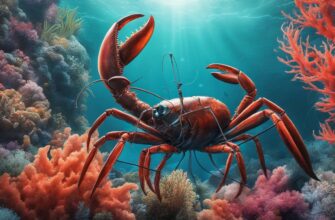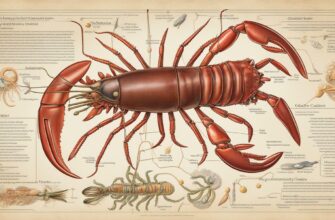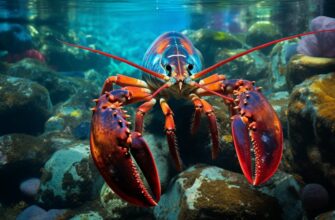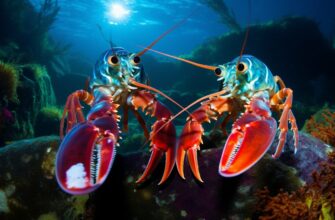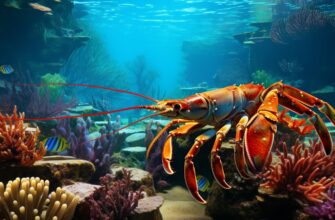When we think of a creature’s brains, we often imagine a mammal’s complex neural system. However, as we explore the fascinating world of crustaceans, we must ask ourselves: do lobsters have brains?
Firstly, it’s important to understand the basics of lobster anatomy. While they may not have a traditional brain, lobsters possess a complex nervous system that controls their movements and senses.
- Understanding Lobster Neurology and Brain Structure
- Understanding Lobster Neurology and Brain Structure
- Decoding Lobster Brain Function
- Exploring Lobster Intelligence
- Exploring the Correlation Between Brain Size and Intelligence
- Specialized Cognitive Abilities of Lobsters
- Final Thoughts
- Comparing Lobsters to Other Animals
- Lobsters vs. Fish
- Lobsters vs. Insects
- Lobsters vs. Other Crustaceans
- Frequently Asked Questions about Lobster Brains
- Do lobsters have brains?
- How big is a lobster’s brain?
- What are some of the functions performed by a lobster’s brain?
- Can lobsters think or feel pain?
- Are lobsters intelligent?
- Do lobsters have memory?
- Can lobsters learn?
- What is the lifespan of a lobster?
Understanding Lobster Neurology and Brain Structure
As with all animals, lobsters have a nervous system that allows them to sense and respond to their surroundings. However, their nervous system is much less complex than that of mammals, including humans, with no centralized brain.
Lobsters have a structure called a ganglion, which is a cluster of nerve cells that acts as a “mini brain” for each segment of their body. These ganglia allow for localized processing of sensory information and motor control, meaning each segment can operate independently.
| Lobster anatomy | Description |
|---|---|
| Ganglia | Clusters of nerve cells that function as mini brains for each segment of the lobster’s body. |
| Thoracic ganglia | A large cluster of ganglia that controls the legs and claws. |
| Cerebral ganglia | Located in the lobster’s head and responsible for processing sensory information, including smell and sight. |
The thoracic ganglia, a large cluster of ganglia, controls the legs and claws, while the cerebral ganglia, located in the lobster’s head, is responsible for processing sensory information, including smell and sight.
Understanding Lobster Neurology and Brain Structure
Despite their decentralized nervous system, lobsters are able to exhibit complex behaviors, such as finding food, avoiding predators, and even forming social bonds. Researchers have found that their ganglia can work in tandem to coordinate these behaviors.
While lobsters may not have a centralized brain, their nervous system is still worthy of study. By understanding how their ganglia work together, researchers can gain insight into the basic mechanisms of neural processing and potentially apply this knowledge to artificial intelligence.
Decoding Lobster Brain Function
Although lobsters do not possess a centralized brain in the same way that humans do, they do have a complex nervous system that enables them to perform a range of cognitive functions.
At the core of the lobster’s nervous system is a structure known as the ganglia, which is comprised of a series of interconnected nerve cells. This structure acts as the lobster’s “brain,” allowing it to process sensory information and coordinate movement.
| Functions of the Lobster Brain: | Description: |
|---|---|
| Sensory Perception | The lobster’s nervous system enables it to detect a range of stimuli, including light, sound, and chemical cues. |
| Motor Control | The ganglia sends electrical signals to the lobster’s muscles, allowing it to move in response to environmental cues or its own internal needs. |
| Memory and Learning | Recent research has suggested that lobsters may be capable of long-term memory and learning, allowing them to adapt to changing environmental conditions. |
Despite these cognitive abilities, it’s important to note that the lobster’s brain is relatively small and simple compared to the brains of other animals. This has led some scientists to question the extent to which lobsters are capable of higher-level thinking and problem-solving.
Overall, the lobster’s brain and nervous system enable it to survive and thrive in a complex underwater environment. While they may not possess the same cognitive abilities as humans or other animals, their remarkable abilities to sense and respond to the world around them make them fascinating creatures to study and observe.
Exploring Lobster Intelligence
The question of whether lobsters are intelligent creatures has long been debated. While some argue that their primitive nervous systems limit their cognitive abilities, recent research has suggested otherwise.
As it turns out, the size of a lobster’s brain is directly correlated with its cognitive abilities. A study conducted by the University of Maine found that larger lobsters possess greater cognitive skills than smaller individuals. This correlation is similar to that observed in other animals, suggesting that brain size plays a determining factor in intelligence.
However, it’s important to note that lobster intelligence is not necessarily comparable to that of humans or even other animals. Their cognitive abilities are specialized to suit their unique environment and lifestyle.
Exploring the Correlation Between Brain Size and Intelligence
Studies show that brain size is directly correlated to intelligence in animals, including lobsters. The University of Maine study found that larger lobsters had more developed nervous systems and cognitive abilities, such as better memory retention and problem-solving skills.
This correlation has been observed in other animals as well. For example, elephants have larger brains and are considered highly intelligent, while birds with smaller brains still display impressive cognitive skills suited to their needs.
However, it’s important to note that brain size is not the only determinant of intelligence. Factors such as neural complexity and connectivity also play a significant role in cognitive abilities.
Specialized Cognitive Abilities of Lobsters
While lobsters may not possess the broad range of cognitive skills observed in other animals, they do possess specialized abilities that suit their unique environment. For example, lobsters have excellent spatial memory, allowing them to navigate complex underwater environments and remember the location of their burrows. They are also able to use chemical cues to locate food and mates, a skill that is critical in their survival.
Their specialized cognitive abilities make lobsters well-adapted to their environment and allow them to thrive in the wild.
Final Thoughts
While the jury may still be out on whether lobsters are “intelligent” creatures, recent research suggests that their cognitive abilities are far from primitive. Their specialized skills and adaptations allow them to excel in their unique underwater environment.
Comparing Lobsters to Other Animals
When it comes to cognitive abilities, lobsters are often underestimated. However, recent research has shown that these crustaceans possess impressive intellectual capacities. So, how do they compare to other animals?
Lobsters vs. Fish
Compared to fish, lobsters have a more developed nervous system and a larger brain-to-body ratio. They are also able to navigate complex environments and have been observed to display territoriality and aggression.
Lobsters vs. Insects
Insects are often considered to be more intelligent than crustaceans. However, studies have shown that lobsters are capable of complex social interactions, such as recognizing individuals and forming hierarchical relationships.
Lobsters vs. Other Crustaceans
When compared to other crustaceans, lobsters stand out due to their impressive cognitive abilities. For example, lobsters have been observed to use complex problem-solving skills to retrieve food and navigate their environments.
Overall, lobsters possess a unique set of cognitive abilities that are not easily comparable to other animals. While they may not be as intelligent as certain mammals or birds, they are far more complex than many give them credit for.
Frequently Asked Questions about Lobster Brains
Here are some frequently asked questions relating to lobster brains:
Do lobsters have brains?
Yes, lobsters do have brains. Their brains are similar in structure to those of insects and are located in their heads.
How big is a lobster’s brain?
The size of a lobster’s brain is relative to its body size. Their brains are small, weighing only a few grams, which is why they are often referred to as having primitive cognitive abilities.
What are some of the functions performed by a lobster’s brain?
A lobster’s brain is responsible for sensory perception, motor control, and processing information from their surrounding environment.
Can lobsters think or feel pain?
While the debate over whether lobsters can think or feel pain is ongoing, research suggests that they have a level of cognition that enables them to sense their surroundings and react accordingly. However, they may not have the same level of consciousness or emotions as humans.
Are lobsters intelligent?
Lobsters have been found to have a level of intelligence that allows them to navigate their environment, communicate with each other, and solve problems. However, their cognitive abilities are limited compared to those of mammals.
Do lobsters have memory?
Research suggests that lobsters have memory and are capable of recalling past events and experiences. This is important for their survival, as it enables them to remember the location of their homes and food sources.
Can lobsters learn?
Yes, lobsters can learn from their experiences and modify their behavior accordingly. This is seen in their ability to adapt to changing environments and learn from other lobsters in their group.
What is the lifespan of a lobster?
The lifespan of a lobster varies depending on the species, but it can be up to 100 years. However, most lobsters that are caught and consumed are only a few years old.
We hope this section has cleared up some of the questions you may have had about lobster brains. Stay tuned for more exciting insights into the world of lobsters!


